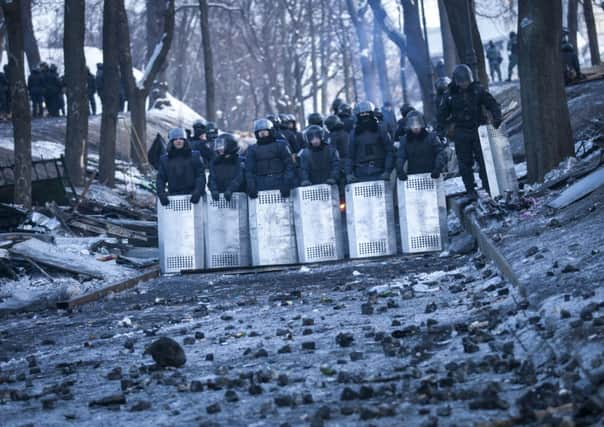Ukraine: PM resigns and anti-protest laws go


By tendering his resignation and that of his cabinet yesterday, Mykola Azarov became the first and most prominent scalp to be claimed by the crisis since it started in late November.
Mr Azarov had become a hate figure for the opposition owing to his loyalty to president Viktor Yanukovich and his hard-line views.
Advertisement
Hide AdAdvertisement
Hide AdThe opposition had accused Mr Azarov of mismanaging the economy and condoning corruption, and ridiculed the Russian-speaker for his poor command of Ukrainian.
Last week Mr Azarov branded demonstrators fighting police on the barricades in Kiev as “criminals” and “terrorists,” but yesterday he stuck a softer tone, stepping down, he explained, as a “social and political compromise”.
He added that his government had “done everything to ensure the peaceful resolution of the conflict” and would do “everything possible to prevent bloodshed, an escalation of violence and violation of citizen’s right.”
The repeal of the anti-protest laws came after MPs, including many from the governing party, voted by 361 to two to overturn them. Rushed through parliament with just a cursory show of hands on 16 January, the laws provoked violent clashes between protesters and police that left at least five people dead and hundreds injured.
The annulment of the laws was greeted by cheers among protesters remaining at the barricades in Kiev, and was welcomed by opposition leaders.
“We have repealed all the laws against which the country rose up,” said Arseniy Yatsenyuk. Petro Poroshenko, an independent MP, claimed Ukraine “had stepped away from the abyss”.
While the concessions wrought from a previously intransigent government and president may bring temporary calm they may also embolden the opposition to keep up the pressure.
The protests erupted after Mr Yanukovich decided to turn toward Russia for a bailout loan instead of signing a trade deal with the European Union, but to many anti-government protesters the real cause has been the failure to address deep-rooted corruption and uphold the rule of law. “We have to change not only the government, but the rules of the game as well,” said Vitali Klitschko, the former world heavyweight boxing champion at the forefront of the opposition. “We are sure the struggle will continue.”
Advertisement
Hide AdAdvertisement
Hide AdDespite Mr Azarov’s resignation, the president asked him to remain in office until a replacement is found. Just who that might be remains unclear.
Last week Mr Yanukovich offered Mr Yatsenyuk the job but the opposition leader declined, preferring to maintain the fight against the government from the outside.
The president’s opponents may opt to stay clear of accepting any positions of power fearing it will suck momentum from a drive for a political overhaul of Ukraine that now appears to be reaping its rewards.
Parliament will today consider an amnesty measure for scores of arrested protesters. But Mr Yanukovich has said the amnesty is only possible if demonstrators clear the streets and vacate the buildings they now occupy – a condition that is probably unacceptable to many.
“The authorities are afraid and making concessions. We should use this moment and continue our fight to achieve a change of power in Ukraine,” said 23-year-old demonstrator Oleg Rudakov.
Azarov’s going won’t alter Putin’s love for common people
Russia will honour its pledge to lend Ukraine $15 billion (£9.4bn) and reduce the price of gas it supplies to its neighbour even after premier Mykola Azarov departs and the opposition forms the next government, president Vladimir Putin has said.
However, Russia’s deputy premier Igor Shuvalov said later that Russia and Ukraine had no agreement yet on the second tranche of the loan and talks between finance ministries were continuing.
President Viktor Yanukovich’s government just managed to avoid bankruptcy with the money pledged in November by Mr Putin. Russia spent $3bn (£1.8bn) to buy Ukrainian bonds in December and has promised to spend up to $15bn, in a move seen by many Ukrainians as an open bribe to stay in Moscow’s sphere of influence.
Advertisement
Hide AdAdvertisement
Hide Ad“Will we review our agreements on loans and the energy sector if the opposition takes power? No, we will not,” Mr Putin said after talks with EU leaders in Brussels.
The loan was to “support the people of Ukraine, not the government. It’s the common people that suffer”, he said.
Russia would, however, monitor Ukraine closely as the loans must be repaid, he said.